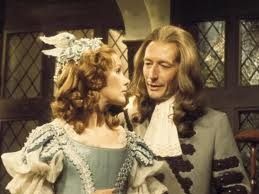
Wow, the hair! It's historically accurate, but still hard to take the men seriously with wigs like that. Ever since Tyler told me that excessive voice-overs are a weakness (show,don't tell), it bothers me, and this series has that component, with various characters providing narration. I can see why it's included, as a wide array of characters are being portrayed, and from what I am now reading (to try to clarify what I'm watching), this was a complicated period in British history, with multiple people vying for the throne of England, religious conflict, and romantic and political intrigue galore. Unfortunately, the sound quality on the DVD was not great, and there were no captions, so some of the narration was unintelligible.
It starts with Charles II as King. James Villiers plays Charles, and I thought he was excellent. He is how I picture Charles, with a good mix of levity and gravity. It's not easy to capture both sides of his personality, and a lot of movies seem to pick one and skip the other when portraying him.
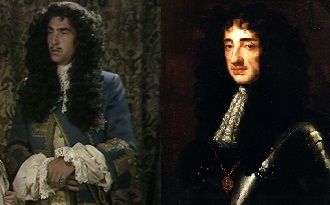 |
| Charles and a portrait of the real Charles II. |
His heir is his brother James, the Duke of York. The Duke of York has two daughters, Mary and Anne, who were both raised Protestant. Protestant Parliament does not want the Duke of York, a Catholic, to become King. Many favor the King's illegitimate son, the Duke of Monmouth. Others want him to divorce his wife, who has not born him any children, and attempt to have a legitimate heir with a new wife. In addition, William of Orange, the King's nephew, also has his eyes on the crown, and by marrying Princess Mary, he strengthens his claim. Charles refuses to endorse any of these candidates, or to allow any alteration to the line of succession:
"I will go very far to preserve the peace in my kingdom. I shall enforce the laws against popery -aye, beyond reason. Even to the allowing of the death of those I know to be innocent, if the law condemns them. But their blood shall be upon their judges and upon their accusers -not, My Lord, upon me. I will accept any measures which will ensure the safety of the Protestant religion. But there are certain things that I will not do. I will not put away the Queen. And if you press for an impeachment against Danby, he shall have my pardon -aye, and I’ll pardon him 10 times over if need be. And most important of all, I shall never agree to change the lawful succession."
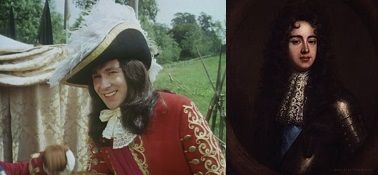 |
| Monmouth and a portrait of the real Duke of Monmouth. |
If you read my review of The Last King, a lot of the same characters appear -including two of the King's mistresses, Lady Portsmouth and Nell Gwynne, briefly.
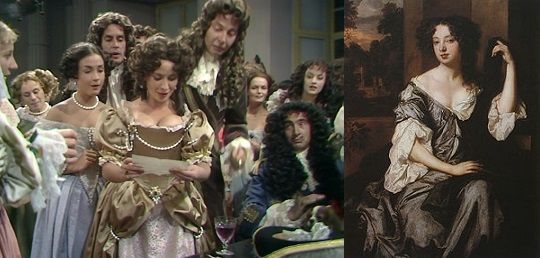 |
| Lady Portsmouth with Charles II and a portrait of the real Lady Portsmouth. |
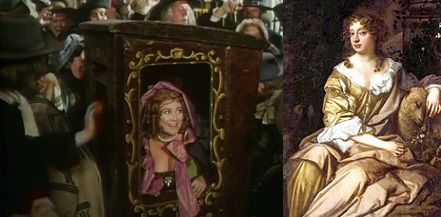 |
| Nell Gwynne and a portrait of the real Nell Gwynne. |
AND the story isn't even officially about any of the people named above.
 |
| A portrait of the real John Churchill, John and Sarah Churchill, and a portrait of the real Sarah Churchill. |
It's about Sarah and John Churchill (the first Duke and Duchess of Marlborough), two important figures operating during this time (Sarah politically and John militarily). The series deals with a lot of military and political issues that I didn't follow as well as I should have. It was complex, and a little dull, particularly the last couple of episodes. I preferred the interpersonal aspects, and paid more attention when those were depicted.
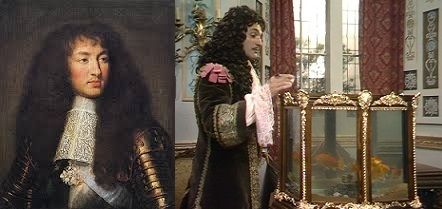 |
| John Churchill received praise from Louis XIV of France (above, next to a portrait of the real Louix XIV) for his actions at the Siege of Maastricht. |
When the series begins, Sarah is a lady in waiting to Mary of Modena, the Duke of York's second wife. Things pick up for her when she befriends Princess Anne, and falls in love with John Churchill, a rising military leader.
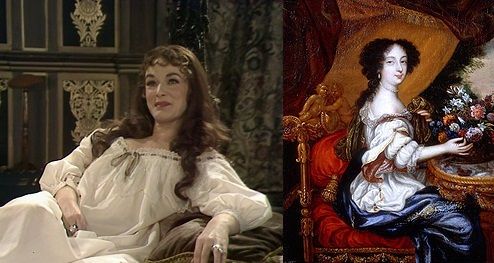 |
| Barbara Palmer and a portrait of the real Barbara Palmer (Lady Castlemaine and the Duchess of Cleveland). |
John is having a fling with the court bicycle, Lady Castlemaine, while his family plans his marriage to an eligible and wealthy lady. The powerful Lady Castlemaine is one of the King's mistresses, and when the King almost walks in on John and her, John jumps out the window rather than be discovered (this is based on a true event, though some say that he actually hid in a cupboard). The King figures it out anyway, but takes in stride:
Castlemaine: If you believe what my enemies say.
Charles II: Your enemies, nay Madame. But as for your friends, that is a different matter. [Looks out window] Only a young gallant, and a brave one, could make such a leap. But I know of one who might venture it…When next you see your cousin -
Castlemaine: My cousin?
Charles II: The one in the red coat. He’s a horse and rascal, but tell him he’s forgiven. He only does it to get his bread.
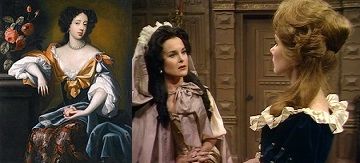 |
| Portrait of Mary of Modena and Mary talking to Sarah. |
This all comes to an end when he meets Sarah. He is smitten, and though both of their families are against it, they get married with the support of Mary of Modena. Together, they are a formidable force, as he predicts:
 "Dear Sarah, this turbulent age will see great events. And if we both live, we will be at the center of them. Without vanity I know that I have the power to control men. I have the strength and patience to win renown and fortune. I crave both. But if it were only for myself, I despise both. What does ambition mean if a man thinks only of himself? Coldness, corruption, and at the last, despair. This was all my former ambition led to. But now by the grace of God I have found warmth, sweetness, hope –and these I demand of you, if you love me, to keep ambition clean."
"Dear Sarah, this turbulent age will see great events. And if we both live, we will be at the center of them. Without vanity I know that I have the power to control men. I have the strength and patience to win renown and fortune. I crave both. But if it were only for myself, I despise both. What does ambition mean if a man thinks only of himself? Coldness, corruption, and at the last, despair. This was all my former ambition led to. But now by the grace of God I have found warmth, sweetness, hope –and these I demand of you, if you love me, to keep ambition clean."While he rises through the military ranks and achieves acclaim, Sarah's relationship with Princess Anne becomes closer, and her influence becomes stronger:
Sarah: If I am to serve you, I consider it my duty not to be a flatterer. Nay, persons of high rank will always flattered by courtiers who will lie to them and cajole them to their own advantage, but this, Madame, I cannot do. You show me great favor, more than I deserve -
Anne: Between you and me there is no question of favor. Next to my husband you are my friend, my only friend. Dearer to me than any sister. And like a good sister ought, you shall tell me of my faults when you see them. Never think to offend me by your frankness, I shall only love you the better for it.
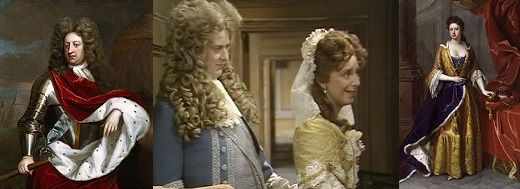 |
| A portrait of Prince George of Denmark, George and Anne, and a portrait of the real Anne, Queen of Great Britain. |
Anne has a good relationship with her husband, George of Denmark, but none of their children live past early childhood. She tells Sarah: "You know, tis a strange thing, they see to be quite gone from me already. Though I loved them. But they were here for such a little while, and now we’re left childless."
Her sister, Mary, likewise has no children with her husband, William of Orange.
After the death of Charles, the Duke of York is named James II of England.
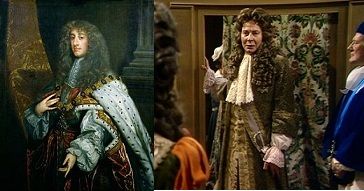 |
| A portrait of the real James II and James as the Duke of York in the series. |
James subsequently fathers a son with his Catholic second wife, Mary of Modena. Or does he? Court gossip claimed that he'd had an imposter baby secreted into the birthing room in a warming pan:
Anne: Then, do you say, the bed curtains were drawn? When?
Sydney Godolphin: About half an hour before the birth.
Anne: Who went inside?
Godolphin: Lady Sunderland, certainly. What others I know not.
Anne: Was the child shown to the people there?
Godolphin: Not at once. About one hour later we all saw a male child.
Anne: One hour later. So that in that time –now what is all this about a warming pan?
Godolphin: Oh, you’ve heard of that?
George of Denmark: We heard of nothing else on the road…
Anne: Was a pan brought in?
Godolphin: There was, but who could possibly believe –
Sarah: Oh, believe it or not, every Protestant in England will swear a child was introduced.
George: Is it possible? Is it possible?
This son was ultimately eliminated from the line of succession when James was deposed. My opinion is that the child was his, but that's only because the whole warming pan scenario feels far-fetched to me, while the anti-Catholics making up a wild, baby-smuggling story like that feels very likely.
William of Orange officially made his move against James in 1688, after consulting his wife, Princess Mary:
 |
| Mary preparing for her coronation. |
Mary: Why yes, often.
William: And have you thought of what I should be?
Mary: Why, what should you be?
William: Whatever you as Queen should decide. By English law you may confer any title and authority upon me. Or give me none at all.
Mary: None at all? But as a wife, whatever is mine must belong to you.
William: Not by law.
Mary: Then I shall abide by God’s law, and whatever happens you shall be the ruler. The husband is never to be obedient to the wife. [William takes her hand] I ask only that you follow your part of the commandment, “Husbands love thy wives as I shall look to mine. Wives, obey your husbands in all things.”
I think what she's getting at is that she wants him to ditch his mistress. Either way, he is clearly pleased with her answer, and sets off to invade England. He becomes William III of England, and she Mary II.
 |
| A portrait of Mary II of England, Mary and William, and a portrait of William III of England. |
James flees, lamenting to his wife, "What else remains? What can I do when even my children have forsaken me?" He vows to follow her abroad, telling her that if he stayed, "They’d put me in the Tower. And then –no King was ever sent there and allowed to live. Oh but have no fears for me. I will come. And later I shall choose my own ground for battle." He is never King again, and when he dies, William is still in power, having outlived his wife.
Anne seemed to harbor some regrets about supporting her sister's cause. At least, she expresses some after receiving a scathing letter of condemnation from her father:
Anne: After this, can I see my sister crowned?
Sarah: You can, Madame, and you must. When a revolution is made, those who go with it, must accept the consequences, and you went far beyond neutrality in opposition to your father.
Anne: I did, but whether it was right to do so...
The relationship between the sisters was not good, and Anne considered Sarah more of a sister, though that "frankness" which Anne claimed to treasure in Sarah eventually came between them. Anne grew tired of Sarah's incessant and pushy advice.
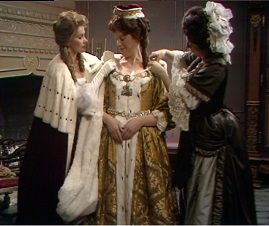 |
| Anne preparing for her coronation. |
After William's death, Anne became Queen in 1702. Over the following years, her friendship with Sarah worsened until Anne refused to have anything further to do with her former best friend, and Anne left court.
Phew! That's a lot of information. Sarah also has many children with her husband, and the two appear to have had a happy, mutually advantageous marriage. A lot happens, and like I said, my eyes tended to glaze over when they got too deep into political or (forgive me, Tyler) military discussions.
The show is good, and very educational. It would be great if they released it again with subtitles. Even better if they remade it into a series like The Tudors or Isabel with a high production value -it has the material for it, for sure!
Note: The death of Anne was the end of the Stuart line, and she was succeeded by George I of the House of Hanover (a second cousin).
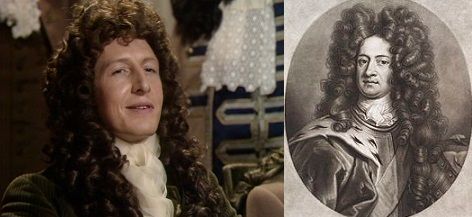 |
| George I and the real George I of Great Britain. |
No comments:
Post a Comment